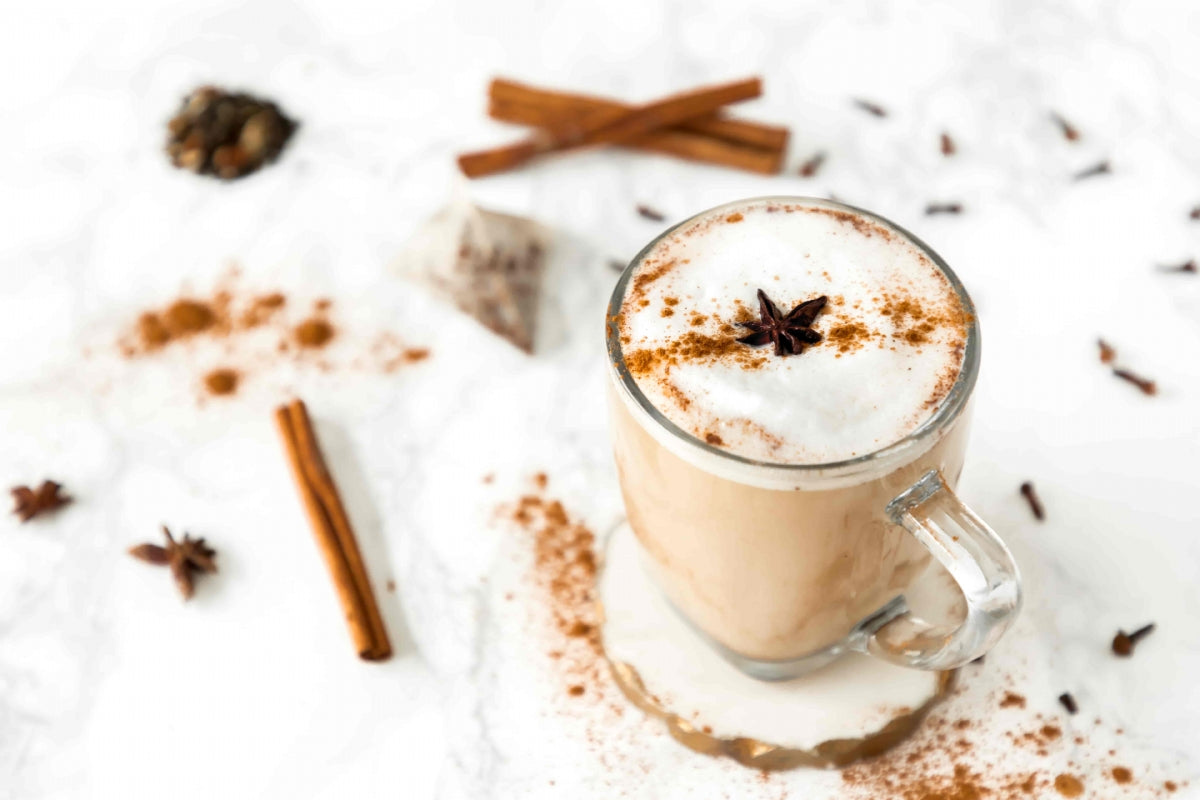8 Incredible Wellness Benefits of Chai Tea!

Chai tea, or masala chai, is one of the most popular teas in India. After China, India boasts second place as the largest tea producer in the world, which is fitting, since “chai” actually means “tea” in Hindi.
Although chai tea is available for order on practically every coffeeshop menu today (especially in a warming latte), this spicy-sweet tea has been loved for thousands of years. Part of its popularity is the use of tea in Ayurvedic wellness traditions, which relies on beneficial plants to support health and well-being. Many of these plants make up the flavorful spices that give chai tea its unique and alluring taste.
What Is Chai Tea?
Although there are different variations on how chai tea is made, it is traditionally brewed with black tea leaves and warming spices. It also contains milk and a sweetening agent to balance the bold spices with sweet flavor. The tea leaves and spices in chai tea have healthful benefits, too! Below you will find eight incredible wellness benefits of chai tea from the supportive nutrients hidden in its potent spices and tea leaves.
Black tea
Black tea leaves are a source of catechins, a type of antioxidant. Antioxidants have been shown to minimize cell damage from free radicals. Free radicals enter your body in many ways, such as through food, the environment, and water. In an examination of what foods had the highest amount of antioxidants, tea and coffee contained the highest amount of antioxidants in the beverages category, including black tea. One of the antioxidants in black tea are catechins, a natural antioxidant. Catechins can cross the blood-brain barrier and have a beneficial impact on cells at the molecular level.*

Ginger
Thousands of years ago, ginger was considered a luxury spice. Today, this herbaceous plant is used for the root, and it remains one of the most beloved spices in teas and cuisines all around the world! Plus, ginger helps ease occasional nausea and motion sickness.*

Cinnamon
Today, you probably pay no more than $5 for a jar of cinnamon. In ancient times, cinnamon was as valuable as gold or silver. Ancient Egyptians used cinnamon for perfumery and in oil blends. Cinnamon adds rich flavor to chai tea and many sweet and savory foods. In the body, cinnamon helps maintain blood sugar levels already within a normal range.*

Black pepper
You might not go one meal without adding a little black pepper to it, but did you know that black pepper contains active compounds that help your body better absorb nutrients? Piperine is an alkaloid that gives black pepper its pungent aroma. It also assists with nutrient absorption and provides antioxidant support.*

Cardamom
Cardamom is a common culinary spice that has also been used for centuries in Ayurvedic tradition for its therapeutic properties, especially in aromatherapy. It has a bold and sweet flavor, and one study even found that the powerful scent of cardamom increased athletic performance during exercise.*

Cloves
Cloves are another unmistakable and aromatic spice that contain some of the most important nutrients your body needs, including antioxidant Vitamin E, fiber, and Vitamin K. In addition, just one teaspoon of ground cloves contains 55% of the Daily Value of manganese, an essential trace element that supports bone health.*

Star anise
Star anise is a unique evergreen tree that grows star-shaped fruits that are harvested before they ripen. Native to Vietnam and southwest China, the flavor of star anise brings a taste similar to licorice to food and drink. It is often added to garam masala, a spice blend used in Indian cuisine. Star anise also has antioxidant properties.

Does Chai Tea Contain Caffeine?
Because chai tea contains black tea leaves, it contains caffeine; however, the amount is significantly less than a cup of coffee. One cup of chai tea contains approximately 50 milligrams of caffeine. The average cup of coffee contains between 80 and 120 milligrams of caffeine depending on various factors, such as the type of beans and how it is brewed. If you are avoiding caffeine, you can make chai tea with decaffeinated black tea leaves instead.

Is Chai Tea Gluten-Free?
Chai tea made with natural ingredients should not contain gluten; however, it depends on the source of ingredients. If you are ordering a chai tea latte at your favorite coffee shop or restaurant, it might be prepared with a pre-made mix that contains gluten.
The best way to make chai tea and ensure that it is gluten-free is to make it yourself! Plus, it will probably taste even better when each ingredient is lovingly handpicked by you—and it is easy to make with Teami’s fall-inspired chai latte recipe!
When making your own chai tea, you will need four basic ingredients: tea, spices, milk, and sweetener. If you are living a dairy-free lifestyle, you can use a milk substitute. Cashew milk is thick and creamy and is similar to the consistency of full-fat milk.
Here's how we make our favorite cozy, fall-inspired chai tea at Teami:
Ingredients:
- 1 bag Teami Chai
- 1 cup hot water
- 1/2 cup milk of choice
- Cinnamon and nutmeg
- Stevia (or honey) - optional
Directions:
Steep Teami Chai in hot water for five minutes and add a small amount of your preferred sweetener. Remove the tea bag and throw away. Use a milk frother to whip milk and pour over chai tea. Sprinkle with cinnamon and nutmeg and enjoy it in your Teami tumbler.

Love,
Adi Arezzini | @adiarezzini
Co-Founder + CEO, Teami Blends
Certified Holistic Nutrition Coach
Discover our Natural Chai Tea Blend
Subscribe to our Newsletter
Subscribe to our newsletter and get 10% off your first purchase

 Instagram
Instagram



